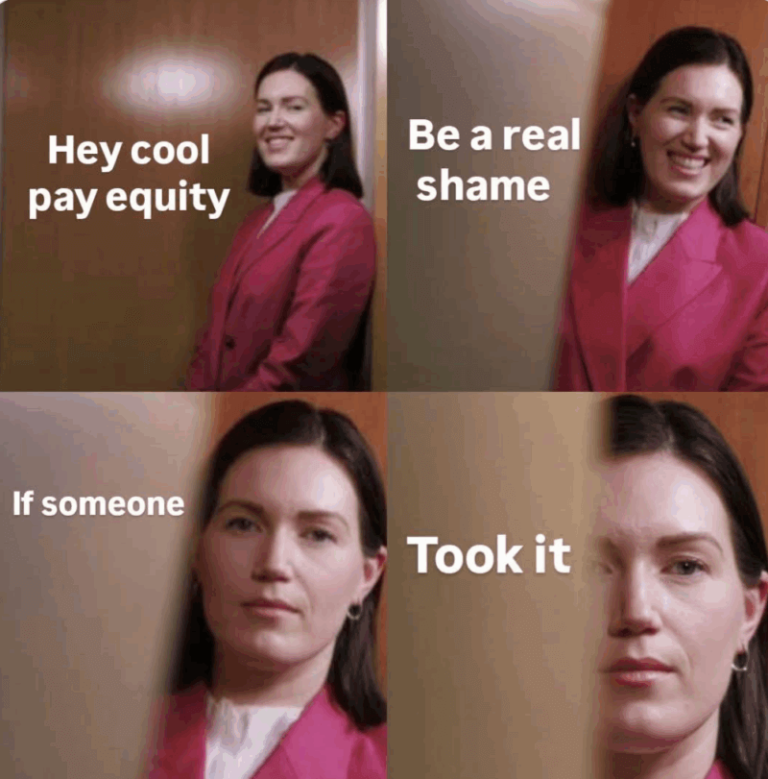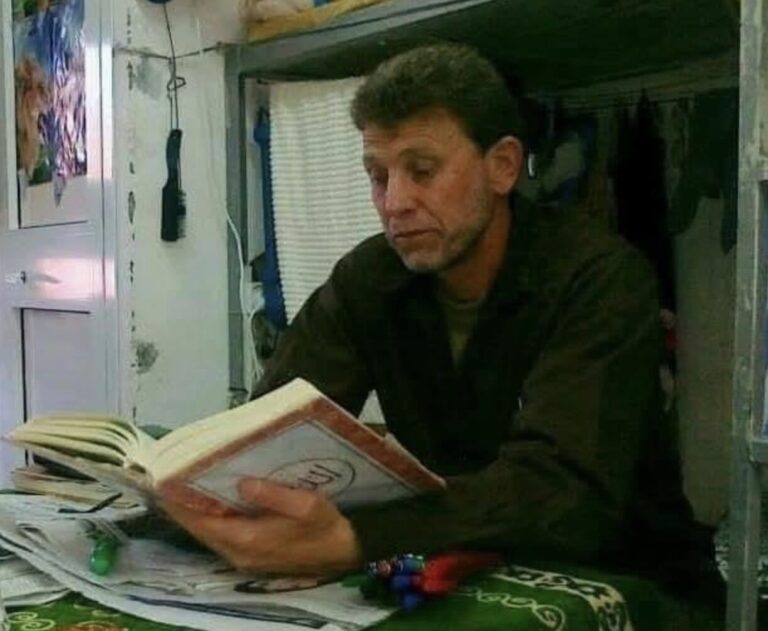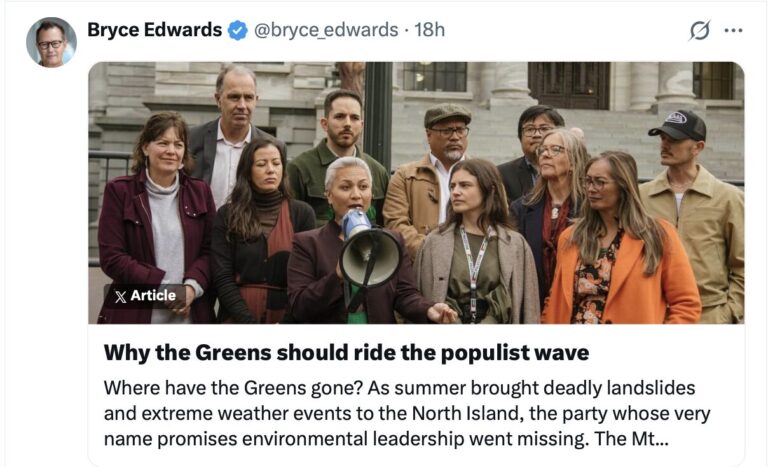Time to talk about progressive actions to stop economy haemorrhaging and to rebuild personal balance sheets
New Zealand is wallowing in the trough of a deep recession with no end in sight. Some say the figures for the June quarter are too much out of date to take seriously, but we are near the end of the September quarter and if anything, the last three months have felt even worse.
Bernard Hickey sums up the cause of the contraction of the economy in the last quarter in his Substack ,The rubber just hit the road. In a bad way:
”the Government’s abrupt halt in early 2024 to discretionary capital spending on housing, roading, hospital planning and school building shocked the construction, infrastructure and local government sectors. It triggered thousands of job losses and hit the psyche of investors and consumers much harder than anything Trump posted on Truth Social…The timing of the Government’s fiscal tightening in 2024 could not have been worse, arriving just as the Reserve Bank’s monetary policy tightening from 2022 and 2023 was at its most severe, and right at the bottom of a 20-30% slump in house values.’
Other ‘economists’ are vehement that problem lies not with the collapse of the economy through deliberate cutbacks of all kinds, but that Nicola Willis has not gone far enough or hard enough. Roger Douglas is leading the charge here with frequent invoking of the need for the ‘courage’ Ruth Richardson showed in 1991. In between, in the wishy washy world of bank economists and the like, various views on how much interest rates need to be cut are endlessly and breathlessly reported.
Bernard Hickey suggests:
There is no serious justification for a fiscal tightening that has driven an already stressed economy into a deeper retail and construction recession. The Government use its balance sheet to borrow and invest to grow the economy to help the Reserve Bank stimulate spending back to growth mode, rather down downward spiral mode.
We can’t wait for interest rate cuts to take effect if ever they would in an economy suffering collapsing confidence. The urgent challenge now is to stop the economy haemorrhaging any more before it turns more sinister.
The damage to low-income household balance sheets has been immense already, but more of the same policy is unthinkable. In major downturns such as the global financial crisis and the pandemic there was a substantial rescue package. This time round, there is nothing at all, but cliches about growth, further miserable cuts and threats of more austerity from a visionless government.
I witnessed the havoc of the 1991 budget and its cuts to the incomes of those who could least afford them, right at the time when the economy was tanking, all in the name of balancing the budget. Child poverty and preventable diseases requiring hospitalisation soared shortly after. As Bernard Hickey says balance sheets of the low-income families are far worse in 2025 than they were in 1991, fewer own their own homes, many have crippling debts and many face fewer job opportunities.
I was one of 15 economists to voice opposition to the current fiscal policies in late 2024. As we predicted cuts to social services, including foodbanks and emergency housing, have led to poor social outcomes with many more desperate and unwell on the streets. As we stated in that letter, the erosion of the “already low psychological and financial reserves of the poorest will be hard – and socially and fiscally costly – to repair”. But repair we must.
First let’s revive a bit of sensible Economics 101. Every student has been taught that the spectre of a wide-spread depression taking hold was eliminated in a modern world because when jobs and demand falls, automatic stabilisers kick in to limit the depth of the recession.
When there is a shock like a major earthquake or collapse of exports markets, income falls, tax revenue falls (GST and income tax) while government spending rises (e.g. unemployment benefits working for families). This automatically widens the deficit and should not be viewed a catastrophe at all but the natural cushioning effects of underpinning confidence and recovery. If these stabilizers are functioning well and no one panics about the rising deficit, the recession will be limited and as recovery takes hold, the deficit will reduce and eventually surpluses may appear. Sometimes in a severe downturn additional temporary government spending may be required to provide needed extra cushioning.
Currently, the challenge we face is more complex because our fiscal cushions are designed for last century, not for the vastly different 21st century. One bright light exception is the pension. The consistent unconditional income provided every week to everyone over 65, whether they have a job or not has undoubtedly been a major factor in keeping the economy from free fall.
Other fiscal measures are failing us. Today households require two parents in paid work just to pay the mortgage but currently, someone who loses their job is not entitled to a Jobseeker benefit if their spouse still has work. If one adult in a couple is disabled or chronically sick the benefits system also works very poorly and unfairly. Entitlement to a benefit must be put on an individual basis as is NZ Superannuation.
If a family accesses any benefit at all, their children miss out on at least $97.50 a week of Working for Families. The rationale is that parents need a work incentive. Clearly \ this is fallacious in today’s slumping economy, and all that happens is their children suffer. In the Global Financial Crisis, the National government gave parents who lost their jobs the full WFF for their children and an extra $100 for their accommodation supplement. Why not now?
Severe work disincentives for the low- and middle-income earners are holding back economic recovery. Overlapping abatements mean that families can face up to a 96% effective marginal tax rate over long income ranges. Debt build-up to the IRD and MSD, student loans and high-cost private lenders is out of hand along with huge withdrawals from KiwiSaver for hardship reasons. Low-income family balance sheets have been shattered and must be deliberately rebuilt.
Others can add to the list but here’s a start to what could and should be done immediately:
- All benefits put on an individual basis.
- All low-income families entitled to the same maximum WFF for their children.
- WFF must be indexed annually along the same lines of the pension.
- The threshold for WFF abatement must rise to at least $60,000 and the abatement fall to 20%.
- Adult benefits must be made more certain and more adequate with removal of the sanctions system and improved access to supplementary hardship provision.
- The accommodation supplement asset limit lifted to $150,000, and abatement reduced to 25%.
- Programme of debt forgiveness implemented.







You could argue that this lot started by giving away money they didn’t have for the general tax cuts and the landlord tax cuts. I guess that’s part of the reason why borrowing continues to grow. I never really understood the landlord tax cuts – landlords are not a large fraction of the electorate and would probably have voted NAct anyway.
I don’t understand the reluctance to income test the pension. It’s a benefit (funded by current taxpayers and paid to current beneficiaries) and all the other benefits are income tested. Asset testing would be OK by me too, but it’s a bit hard. I say this as someone who would lose all my pension if such a policy was introduced. I get beaten around the head for being hypocritical when I take it, but it’s my money and what I do with it is noone’s business. People like me just shouldn’t be getting it. Maybe I am a bit of a hypocrite 🙂
The there’s the privileged position of oldies – as noted elsewhere – having an indexed welfare payment.
Testing the pension would save a billion or two. Reinstating the LL tax would claw back a billion or so. Killing the PAYE tax cuts might be a bit harder, so that path would likely be fixed by hiking GST with a whole lot of blather about how it is “income neutral”. CGT is a slow burner as the clock would only start from when the tax is introduced.
Dunno where it is all going …
But one hears these horror stories of job seekers applying for dozens of jobs and getting nowhere. People with qualifications willing to stack supermarket shelves and getting noplace. People have bright ideas about how tarting up your CV might help but that doesn’t create a single new job. Just moves you up the pile a bit while moving someone else down.
And your comment is exactly why I moved to Australia, they are progressive.
Some things are timeless
https://www.youtube.com/watch?v=usYgf8cVfvU
Well, FMD. I get to the end of the commentary and comments to find this. Brighter future under the current coalition? What planet are you on BtheF?
Interesting but true comment that Government transfers in the form of pensions, is one of the few factors keeping spending up, and the economy from freefall.
The Coalition of cockups desperately adding a bit of spending at present, to cover up their crashing the economy, is a tacit admission of the reality they deny. Government investment, “tax and spend” is essential for a functioning economy. Removing money from communities is a recipe for failure.
Also, welfare, like taxation should be on an individual basis. It has never been fair that tax depends on your individual income, but the social wage, welfare, depends on if you have an earning sexual partner.
Thank you Susan.
I’m asking as two people I know had their father’s abandon their families and live overseas for the rest of their lives.
Those deadbeats never paid a cent towards their children and would occasionally visit NZ. Their children typically heard of the visits through family ties.
Fast forward to deadbeat dads retirement. Both people were shocked when the fathers pension was docked and the money given to their mothers, roughly $60 a week.
Those men never paid tax in NZ, never supported their children and then get the State to pay their back dated child support.
Pretty shit!
I would rather that their entire pension was paid towards the families they abandoned.
Didn’t want to support your children?
Then don’t expect a pension.
Yes, Susan I call credit card spending, ‘tick em up bro’ too many NZers living above their means and want to be Joneses. Despite being offered one I never got a credit card too tempting.
Thank goodness for Susan St John,
who speaks up for the children trapped in grinding poverty, with the hard data to confirm the crippling impact on households facing abatement thresholds that remove working for families tax relief.
Some economists like Max Rushbrooke, have done the analysis that proves how once hard working kiwis, especially migrants from the Pacific, could make sure their next generation were educated and able to achieve home ownership. Now such migrant parents are trapped in a poverty cycle, and their next generation
has little hope of getting out of the same trap in their life time.
A spiraing recession requires active Govt intervention, and this was understood in the 1930’s and into the 1940’s. In fact it was the only way forward out of the great depression.
But the decision makers today, don’t study history, or take a long range view
but rather myopically set their sights
on the limited goal of balancing the fiscal debt. This neo-liberal brain washed crew are unable to see they have a responsibility to provide the cushioning needed to create a recovery platform. How tragic!
Thanks Anne-Marie and for emphaisizing the cruel abatement of WFF and student loans and accommodation supplement etc and the connection to poverty. Today we learn government is bringing forward some construction spending- too little too late–but better than nothing. They need to also ensure the workers get enough in the hand to make their efforts worthwhile
A couple of stand out features of how NZ’s neoliberal economy doesnt work is that to remain profitable around 10% of landlords need an accomodation subsidy and other businesses in need are given the WFF subsidy for 12% of their staff.
around 10% of landlords need an accomodation subsidy and other businesses in need are given the WFF subsidy for 12% of their staff.
This is really important, tax payers subsidising landlords and businesses because one charges more than people can afford and the other simply does not pay enough for people to live on. But they are never ever thought of as the bludgers!
Ximon thankyou for the link it is a very good listen. We must rediscover how to support and grow the middle class for prosperity to be widely shared. Lets start by abolishing student loans and annually write off existing annual debt repayments due for everyone who stays and works in NZ.
Excellent Susan.
We must rediscover how to support and grow the middle class for prosperity to be widely shared.
We must have capital gains tax – I remain really concerned that Labour will not do this, think of all the teachers I know who have rentals as their retirement fund, more teachers vote for Labour than anyone else. And we MUST reverse this nonsense of landlords not having to pay the tax they did before.
We must have a wealth tax – wealth is never made by oneself we know that despite being told that so and so is a self made millionare, complete BS.
We must have a financial transactions tax this will rake in plenty even if it is only at 0.05%.
Why don’t we have death duties.
Why isn’t the government probably funding OUR BANK (Labour didn’t either). That is the only bank we should have. A bank for the people.
Why can’t we return to have a much higher tax rate like we did before. Is this because people scare us into this capital flight idea. This would make for a much fairer more equitable society. I’d like to see the tax rates much more spread than they currently have an increase for every $100,000 more you earn over $200,000. The money that some people are paid is frankly obscene. You are not telling me we couldn’t find someone equally as good to run AirNZ on less salary than is current. A base rate of $1.65m who needs that sort of money it makes me very angry that the egalitarian society that I was a part of at school in the fifties and sixties has well and truly gone. The kids I went to school with many of them lived in state houses in Woolston, Otautahi and their parents worked in one of the 5 rubber mills in the area. My parents had their own home and had a small business but we were all much of a muchness no class difference really.
Sorry if the TED link didn’t work; here’s the YouTube version.
It’s well worth a watch – an oldie but a goodie
https://www.youtube.com/watch?v=q2gO4DKVpa8
Sigh.
This whole mess was entirely predictable the moment this Coalition got into power.
The right wing governments always do this kind of insane destructive “reforms”. Every. Single. Time.
Wealth tax now, please. We don’t have time for any kind of bs incremental CHT. Tax the rich right now.
Otherwise there will be pitchforks.
https://www.ted.com/talks/nick_hanauer_beware_fellow_plutocrats_the_pitchforks_are_coming?utm_campaign=tedspread&utm_medium=referral&utm_source=tedcomshare
We were in the shit before the coalition got in because of the gutlessness of the previous government!
what gutlessness do you refer to – please elaborate or are you simply another RW troll?
Michal meant Key’s National government
Bob they got a mandate they could have done anything. In the first six weeks they could have made dramatic changes to benefits, etc as laid out by Susan. Three years later we would then have seen the effects of those changes. More kids would be able to go to school with lunches, and decent housing and clothing. And the minimum wage should have gone up. With all of this we probably would have had fewer people in prison… all governments sadly think so short term frightened of the end of the 3 year term that is gutless.
Whilst it is true that Jacinda said there would be no capital gains tax on her watch, Hipkins just went on with that when he got the job – he had never said there will be no capital gains, that was pathetic.
I am not a troll at all I write on here regularly, I used to be a member of the Greens and am now a member of Te Pati Maori.
Govt. needs to discourage capital hoarding through stiff capital and land taxes, and heavy bank regulation.
NZ suffered a great reset under the thieving hands of Roger Douglas, and his accomplices, but it has come to the end of the line. The mumbling mysticism of an Ideological Treasury was never credible, but it can no longer be pretended that they offer NZ anything beyond a tired litany of excuses.
New Zealand’s choice is simple – a soft reset, with a degree of civility, or a hard reset replete with the settling of scores against the thieving arseholes who have impoverished and continue to impoverish our nation.
The property bubble is over, and palliatives like working for families need to be completely reworked. We are essentially bankrupt, and once the blood funnels of the parasites responsible have been prised from the body of their victim, we must begin to rebuild. The rebuild begins with education – what we can spare must be invested in the next generation. It is not a business model we need – they are the problem. Education must be resourced until it succeeds, not pared down to the point of failure. The same is true of health and social welfare. Serious consideration must be given to shrinking Parliament – representation has not improved by a proliferation of MPs.
Might as well scrap Treasury – if they can’t average 3% they don’t know enough to be worth paying.
In my econ101 and econ102 I was lied to. Economics is a cult and they make assumptions repeating them until it becomes fact. As zealots in a cult they protect their own to not take any criticism as cults do. They do not understand energy, money, and double entry accounting for starters.
fair enough comments. you are right about double entry accounting
As a matter of interest what do they not understand about double entry accounting.
Yes, Rangi but this government is creating more beneficiaries.
Not sure what that has to do with it.
Fix what causes the creation of beneficiaries and then you don’t need to worry about it.
Of course the band aids are necessary to patch the damage, but always focus on the root cause and not the symptoms.
100% correct
I don’t think society has any future at all if all we can do in response to the scourge of neoliberalism is rearrange the bandages.
We need to stop making lists of what could or should (but never will) be done and start fighting the enemy.
Treat the underlying cause not tinker with the symptoms.
The wish list is patching up the terror caused by inequality and just makes the beneficiaries subject to dependency and making them the scapegoat for the problems societies face instead of providing them with a means to provide for themselves and their whanau.
Great comment and very true, that is what Labour does when they get back in tinker!
No tinker we tailor
We stopped building,our builders and construction workers have left what do you expect. It’s trickle down in action in real time. How’s that working for you ??
We need to rebuild NZ from the bottom up which will lift the whole country .End poverty tomorrow and watch NZ boom like it has never done before .If every one is contributing the country will go ahead in leaps and bounds .Currently we have a small group draining everything out of NZ socially and economicly .
The reluctance by NZ economists to mention or discuss fiscal policy is a wonder to behold. They just can not bring themselves to admit the impact of fiscal policy on the economy. It’s as though it is forbidden.
It is very weird. Fiscal policy is of critical importance and in my opinion the current situation is so desperate even the suggested improvement in the automatic fiscal stabilizers is not going to be enough. It is time to deliberately increase the structural fiscal deficit (ie the remaining fiscal deficit at full employment). This could be time limited focused boosts, or long-term debt forgiveness programmes to restore confidence. Capital or investment spending must be expanded. For example, restoration of necessary state house building and a programme to adequately house the homeless is the state’s duty and would play a vital protective fiscal role.
Yes and this is not a radical or particularly new approach. Since the 1930’s governments have used counter cyclical fiscal policy via deficit spending to target full employment.
That changed in the 80’s. Center right governments in NZ appear to want higher unemployment as this holds down wages and bargaining power. Smaller government and lower taxes does the same.
You can correlate above 5% un-employment with nearly every National led government since the 90’s. I don’t think that is just an accident of circumstance.
One bank economist with his fingers crossed reckoned an uptick in credit card borrowing is a ‘green shoot’.
Or it means the middle class are resorting to paying their bills on the zipzap.
It is so tiresome to hear these so-called commentators and their confusions about saving and spending. Credit card debt is the worst kind and when basic spending requires credit card debt we are in real trouble